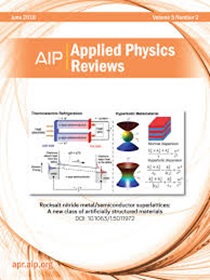人工智能推进绿色制氢的前景:从材料到应用
IF 11.6
1区 物理与天体物理
Q1 PHYSICS, APPLIED
引用次数: 0
摘要
通过水电解生产绿色氢(H2)为各行业脱碳提供了一条可持续的途径,因为它有可能取代化石燃料并实现碳中和。传统的氢气催化剂开发方法,如电化学催化(EC)、光电催化(PEC)和光催化(PC),主要依赖于经验和试错方法。虽然已经取得了重大进展,但这些方法耗时长,成本高,并且受到多组分催化剂和反应系统复杂性的限制。近年来,人工智能(AI)和机器学习(ML)已经成为加速催化剂发现和优化的变革性工具。人工智能驱动的方法可以实现高通量筛选材料,预测催化剂性能和实时反应机制,为传统实验提供更有效的替代方案。本文综述了绿色制氢催化剂的发展现状,重点介绍了人工智能在优化析氢和析氧反应(HER/OER)中的作用。我们将探讨电化学、光电化学和光催化系统的进展,强调人工智能在该领域的革命性潜力。通过将人工智能与实验技术相结合,研究人员有望在效率、可扩展性和成本效益方面取得突破,加速向可持续的氢动力未来过渡。本文章由计算机程序翻译,如有差异,请以英文原文为准。
Prospects of AI in advancing green hydrogen production: From materials to applications
Green hydrogen (H2) production via water electrolysis offers a sustainable pathway to decarbonize various industries, driven by its potential to replace fossil fuels and achieve carbon neutrality. Traditional approaches to catalyst development for H2 production, such as electrochemical catalysis (EC), photoelectrochemical catalysis (PEC), and photocatalysis (PC), have predominantly relied on empirical, trial-and-error methods. While significant progress has been made, these methods are time-consuming, costly, and limited by the complexity of multicomponent catalysts and reaction systems. In recent years, artificial intelligence (AI) and machine learning (ML) have emerged as transformative tools for accelerating catalyst discovery and optimization. AI-driven approaches enable high-throughput screening of materials, prediction of catalyst performance, and real-time reaction mechanisms, offering a more efficient alternative to conventional experimentation. This review examines the current state of catalyst development for green H2 production, highlighting the role of AI in optimizing hydrogen evolution and oxygen evolution reactions (HER/OER). We explore advancements in electrochemical, photoelectrochemical, and photocatalytic systems, emphasizing the potential of AI to revolutionize the field. By integrating AI with experimental techniques, researchers are poised to achieve breakthroughs in efficiency, scalability, and cost-effectiveness, accelerating the transition toward a sustainable, hydrogen-powered future.
求助全文
通过发布文献求助,成功后即可免费获取论文全文。
去求助
来源期刊

Applied physics reviews
PHYSICS, APPLIED-
CiteScore
22.50
自引率
2.00%
发文量
113
审稿时长
2 months
期刊介绍:
Applied Physics Reviews (APR) is a journal featuring articles on critical topics in experimental or theoretical research in applied physics and applications of physics to other scientific and engineering branches. The publication includes two main types of articles:
Original Research: These articles report on high-quality, novel research studies that are of significant interest to the applied physics community.
Reviews: Review articles in APR can either be authoritative and comprehensive assessments of established areas of applied physics or short, timely reviews of recent advances in established fields or emerging areas of applied physics.
 求助内容:
求助内容: 应助结果提醒方式:
应助结果提醒方式:


